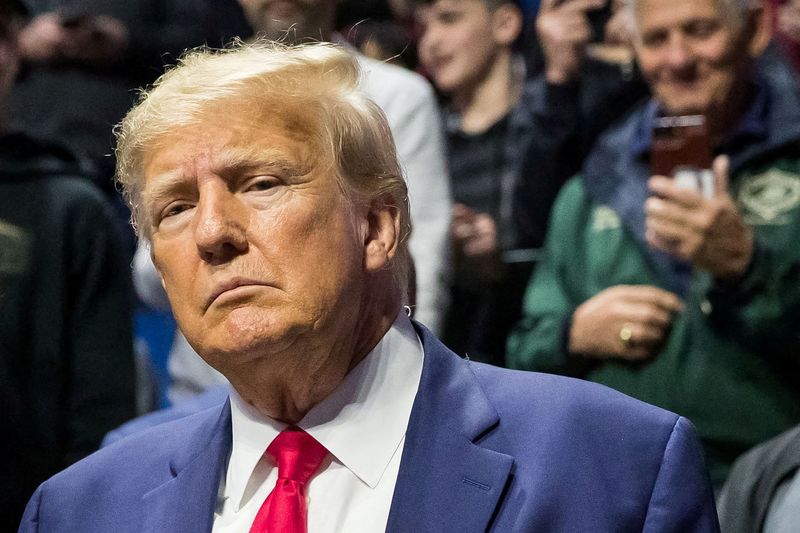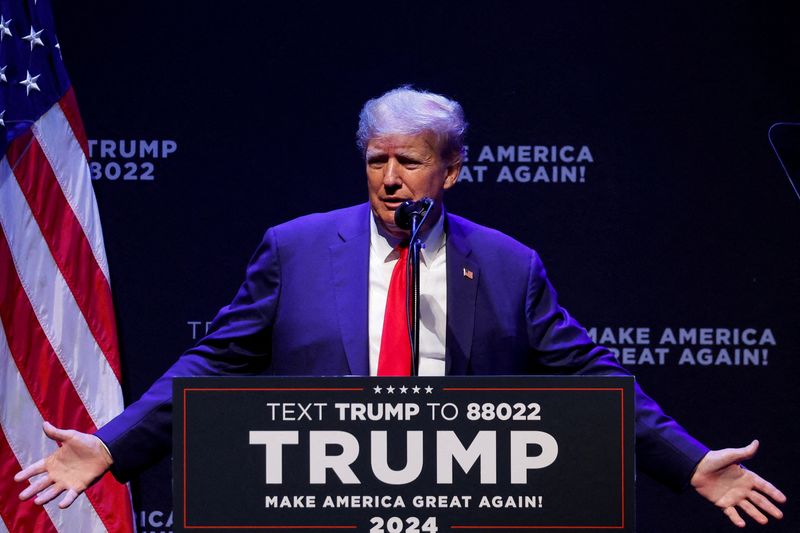By Karen Freifeld
NEW YORK (Reuters) - Another day passed on Wednesday without an indictment against former President Donald Trump, who had forecast he would be arrested on Tuesday in a Manhattan probe of alleged illegal hush-money payments he made to porn star Stormy Daniels.
A Manhattan grand jury did not meet as had been expected on Wednesday, a law enforcement source said, although it was unclear why that was or how much longer the grand jury would take to conclude its work.
If indicted, Trump would be the first U.S. president to face criminal charges in a court.
The grand jury, a panel of U.S. citizens residing in Manhattan, has been considering evidence in one of many legal probes swirling around Trump as he mounts a comeback bid for the 2024 Republican presidential nomination.
The panel, which is believed to meet three times a week, could reconvene on Thursday at the earliest. The Insider news outlet first reported the news that the grand jury would not convene on Wednesday.
A spokesperson for Manhattan District Attorney Alvin Bragg's office declined to comment on the grand jury.
The office has been investigating $130,000 paid in the final weeks of Trump's 2016 election campaign to Daniels, a porn star who said she had a sexual encounter with Trump in 2006 when he was married to his current wife Melania.
Trump's former fixer Michael Cohen has said he made the payment at Trump's direction to buy her silence. Trump has denied an affair took place.
Cohen went to prison after pleading guilty to federal charges stemming from the payoff, but prosecutors in that case did not charge Trump. Manhattan has started and stopped its own investigation into the matter several times.
About half of Americans believe the New York investigation is politically motivated, but a large majority find it believable that Trump paid hush money to a porn star, according to a Reuters/Ipsos opinion poll concluded on Tuesday.
If charges are filed in the Manhattan case, Trump will have to travel to New York from his Florida home for a mug shot and fingerprinting. Security officials are bracing for possible unrest, but so far few of Trump's supporters have heeded his call for protests.
It is typical in a non-violent case like this one for the district attorney to work out timing for a defendant to surrender, a spokesperson for the New York state court system said.
"It could be three days later, it could be a week later, it could be in May," said the spokesperson, Lucian Chalfen. "There is no prescribed time frame. There is no predetermined or statutory time frame."
Trump's fellow Republicans have criticized the probe by Bragg, a Democrat, as politically motivated.
On Wednesday, Trump appeared to suffer a setback in another investigation.
Several media outlets reported that his lawyer, Evan Corcoran, would testify on Friday before a federal grand jury in Washington investigating whether Trump mishandled sensitive federal documents.
Special Prosecutor Jack Smith had argued that Trump had not been truthful with his lawyer, and thus normal attorney-client protections should not apply.
Along with the federal documents probe, Trump and his political allies also face two criminal investigations, one in Georgia and one by the federal government, stemming from their attempts to overturn his 2020 presidential election defeat.

On top of that, he faces two investigations in New York into his business practices and a defamation case by a woman who claims he raped her in the 1990s, a claim Trump denies.
Trump has escaped legal peril numerous times. In the White House, he weathered two attempts by Congress to remove him from office, including for the Jan. 6, 2021, assault on the U.S. Capitol by his supporters, as well as a years-long probe into his campaign's contacts with Russia in 2016.
